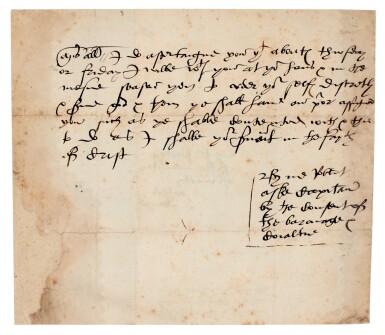History in Manuscript: Letters and Documents from a Distinguished Collection
History in Manuscript: Letters and Documents from a Distinguished Collection

Robert Aske | Autograph letter signed, arranging his visit to the monastery of Watton in Yorkshire, 1536
Lot Closed
April 13, 01:02 PM GMT
Estimate
1,200 - 1,800 GBP
Lot Details
Description
Robert Aske
Autograph letter signed ("Robert aske Capitan"), to the Brethren of the monastery of Watton in Yorkshire ("Masters all"),
Announcing his planned visit to the monastery (“…I do asertaigne yow that about thursday or friday I wilbe with yow at y[ou]r hous & in the mesme season then to order y[ou]r selfes discretly & before god…”), assuring them that “I shalbe y[ou]r servant In the faith of crist”, one page, 8vo, integral autograph address panel (“to the brethryn of the monestary of watton be this delivered”), [late October 1536], annotated in a later hand, strengthened with card to one edge, repaired, light foxing
A DOCUMENT SIGNED BY THE “CHIEF CAPTAIN” OF THE GREATEST REVOLT IN TUDOR ENGLAND, THE PILGRIMAGE OF GRACE. Robert Aske (c.1500-1537) was a Yorkshire lawyer who in October 1536 emerged as a leader of the growing rebellion in Lincolnshire and Yorkshire against the suppression of traditional Catholic religious practices following the break with Rome. The rebellion grew with remarkable speed: on 16 October 1536 Aske led 10,000 men to York, where he issued a proclamation that described the rebellion as a pilgrimage for the restoration of Christ’s church. The Gilbertine priory of Watton, near Beverley, was a house of 60 to 80 monks and nuns. It was in the geographical heartland of the revolt and John Hallam, one of the leaders of the Pilgrimage, was from Watton. The prior, however, had remained loyal to the crown and fled south at the outbreak of the insurrection. Aske is known to have visited Watton Priory on 1 November 1536 to persuade the brethren to accept the sub-prior into the vacant position, and this letter presumably dates from a few days before that visit.
At the time of this letter there was a temporary truce, with the rebels promised a pardon and a Parliament to be held at York. Aske even went to court in London over Christmas 1536 to advise the King on the future government of the north. Once the government felt secure, however, they were quick to strike: Aske was arrested in April 1537 and by July his body was hanging from a chain in York.
The present document was apparently unrecorded prior to its sale in 1995. No other document signed by Aske is recorded at auction.
LITERATURE:
Richard Monckton Milnes, Baron Houghton; thence by descent; Christie's London, 29 June 1995
